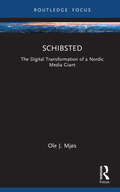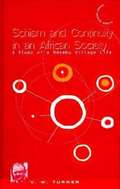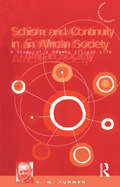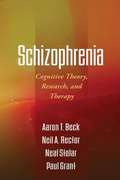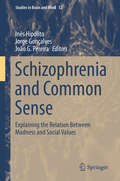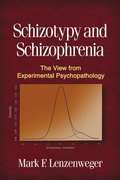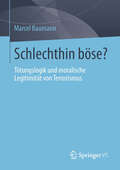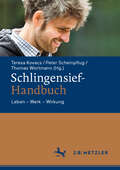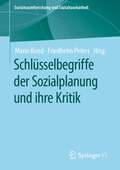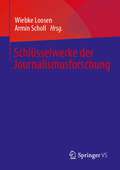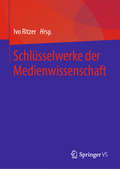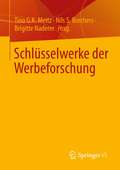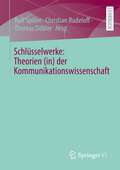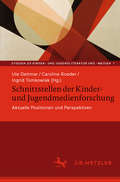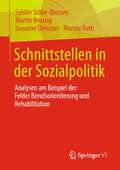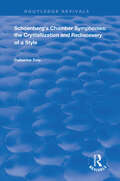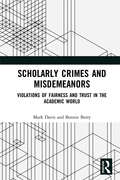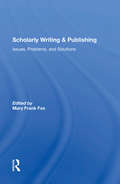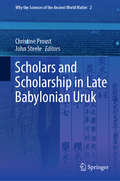- Table View
- List View
Schibsted: The Digital Transformation of a Nordic Media Giant (Global Media Giants)
by Ole J. MjøsThis is the first book of its kind to examine Schibsted, one of the largest traditional media and newspaper companies in the Nordic region, which is today considered a regional and international digital media pioneer.The book examines the rise and role of Schibsted - an early mover and proactive media company in terms of technology adoption, digitization, and online expansion - in its home region, along with its major international ventures. The book focuses on its position in the Nordic digital media landscape, one of the world’s most digitally mature media markets and most digitally networked region, which is today influenced by fierce competition from expanding global internet giants and platform infrastructure. Drawing on a wealth of sources, including original interviews with senior Schibsted executives, which allow unprecedented insight into the company, the book also details its digital expansion internationally, and particularly its pioneering role as originator of the world’s largest online classified advertising company.This book will be of interest to students and scholars of global media and communication studies, particularly those specializing in international communication and media industries in a global context.
Schism and Continuity in an African Society: A Study of Ndembu Village Life
by V. W. TurnerThis book -- Turner's first 'social drama' study -- focuses on the village life of the Ndembu of Zambia who were then under British rule. The social constraints, such as the matrilineally-inherited headmanship system, and the various releases from these constraints, provoked periodic crises which caused great disruption and pain. These crises made visible the contradictions between the principles governing social life and the conflicts experienced between individuals and groups when enforcing these principles.
Schism and Continuity in an African Society: A Study of Ndembu Village Life (Classic Reprint Ser.)
by Victor TurnerWith a new foreword by Bruce Kapferer, Professor of Anthropology, James Cook University- A reprint of the seminal anthropological work of the 1960s. Originally published by Manchester University Press.Victor Turner will be remembered as the anthropologist who developed the concept of the ‘social drama', a method used extensively by anthropologists to describe and analyse the social life of a community. In essence, this technique involves analysing social crises within a community over a period of time in order to gain a better understanding of the key principles that govern the social life of the community.This book -- Turner's first ‘social drama' study -- focuses on the village life of the Ndembu of Zambia who were then under British rule. The social constraints, such as the matrilineally-inherited headmanship system, and the various releases from these constraints, provoked periodic crises which caused great disruption and pain. These crises made visible the contradictions between the principles governing social life and the conflicts experienced between individuals and groups when enforcing these principles. Seven social dramas are discussed - all from one family over a period of twenty years -- each substantiated by sociological and demographic research.
Schizogenesis: The Art of Rosemarie Trockel
by Katherine GuinnessA deep analysis of an enigmatic artist whose oeuvre opens new spaces for understanding feminism, the body, and identity Popular and pioneering as a conceptual artist, Rosemarie Trockel has never before been examined at length in a dedicated book. This volume fills that gap while articulating a new interpretation of feminist theory and bodily identity based around the idea of schizogenesis central to Trockel&’s work.Schizogenesis is a fission-like form of asexual reproduction in which new organisms are created but no original is left behind. Author Katherine Guinness applies it in surprising and insightful ways to the career of an artist who has continually reimagined herself and her artistic vision. Drawing on the philosophies of feminists such as Simone de Beauvoir, Shulamith Firestone, and Monique Wittig, Guinness argues that Trockel&’s varied output of painting, fabric, sculpture, film, and performance is best seen as opening a space that is peculiarly feminist yet not contained by dominant articulations of feminism. Utilizing a wide range of historical and popular knowledge—from Baader Meinhof to Pinocchio, poodles, NASA, and Brecht—Katherine Guinness gives us the associative and ever-branching readings that Trockel&’s art requires. With a spirit for pursuing the surprising and the obscure, Guinness delves deep into a creator who is largely seen as an enigma, revealing Trockel as a thinker who challenges and transforms the possibilities of bodily representation and identity.
Schizophrenia
by Aaron Beck Neil RectorFrom Aaron T. Beck and colleagues, this is the definitive work on the cognitive model of schizophrenia and its treatment. The volume integrates cognitive-behavioral and biological knowledge into a comprehensive conceptual framework. It examines the origins, development, and maintenance of key symptom areas delusions, hallucinations, negative symptoms, and formal thought disorder. Treatment chapters then offer concrete guidance for addressing each type of symptom, complete with case examples and session outlines. Anyone who treats or studies serious mental illness will find a new level of understanding together with theoretically and empirically grounded clinical techniques.
Schizophrenia Is a Misdiagnosis
by C. Raymond LakeSchizophrenia is the most widely known and feared mental illness worldwide, yet a rapidly growing literature from a broad spectrum of basic and clinical disciplines, especially epidemiology and molecular genetics, suggests that schizophrenia is the same condition as a psychotic bipolar disorder and does not exist as a separate disease. The goal is to document and interpret these data to justify eliminating the diagnosis of schizophrenia from the nomenclature. The author reviews the changing diagnostic concepts of schizophrenia and bipolar disorder with a historical perspective to clarify how the current conflict over explanations for psychosis has arisen. That two disorders, schizophrenia and bipolar, known as the Kraepelinian dichotomy, account for the functional psychoses has been a cornerstone of Psychiatry for over 100 years, but is questioned because of substantial similarities and overlap between these two disorders. Literature in the field demonstrates that psychotic patients are frequently misdiagnosed as suffering from the disease called schizophrenia when they suffer from a psychotic mood disorder. Such patients, their families, and their caretakers suffer significant disadvantages from the misdiagnosis. Psychotic patients misdiagnosed with schizophrenia receive substandard care regarding their medications, thus allowing their bipolar conditions to worsen. Other adverse effects are substantial and will be included. Liability for medical malpractice is of critical importance for the mental health professionals who make the majority of the diagnoses of schizophrenia. The concept put forward in this work will have a discipline-altering impact.
Schizophrenia and Common Sense: Explaining the Relation Between Madness and Social Values (Studies in Brain and Mind #12)
by Inês Hipólito Jorge Gonçalves João G. PereiraThis book explores the relationship between schizophrenia and common sense. It approaches this theme from a multidisciplinary perspective. Coverage features contributions from phenomenology, cognitive neuroscience, philosophy of mind, psychology, and social cognition. The contributors address the following questions: How relevant is the loss of common sense in schizophrenia? How can the study of schizophrenia contribute to the study of common sense? How to understand and explain this loss of common sense? They also consider: What is the relationship of practical reasoning and logical formal reasoning with schizophrenia? What is the relationship between the person with a diagnosis of schizophrenia and social values? Chapters examine such issues as rationality, emotions, self, and delusion. In addition, one looks at brain structure and neurotransmission. Others explore phenomenological and Wittgensteinian theories. The book features papers from the Schizophrenia and Common Sense International Workshop, held at New University of Lisbon, November 2015. It offers new insights into this topic and will appeal to researchers, students, as well as interested general readers.
Schizophrenia: Innovations in Diagnosis and Treatment
by Colin RossLearn about a pioneering alternative to antipsychotic medication for schizophrenia! In Schizophrenia: Innovations in Diagnosis and Treatment, Dr. Colin A. Ross-founder of the Colin A. Ross Institute for Psychological Trauma-presents a new theory of the existence of a dissociative subtype of schizophrenia. Dr. Ross determines that some patients diagnosed with schizophrenia have symptoms closely related to dissociative identity disorder-or multiple personality disorder-and have a history of psychological trauma. In these cases, this unprecedented book proposes that the disorder is treatable-perhaps even curable-using psychotherapy rather than drugs. Schizophrenia: Innovations in Diagnosis and Treatment will revolutionize the profession of psychology with data, arguments, and a review of previously published literature to support Dr. Ross&’s theory. Traditionally, schizophrenia is considered manageable only by a lifetime of psychotropic drugs-expensive, harmful, and often ineffectual. This book offers an alternative free of damaging chemicals to improve quality of life for patients with schizophrenia whose symptoms may be trauma-based. Schizophrenia: Innovations in Diagnosis and Treatment offers specific, detailed ideas and research on: genetic studies showing that while there is a genetic connection, it is not prevalent enough for biology to be the only predisposing factor in all cases of schizophrenia a comparison of the definitions of psychosis, schizophrenia, and dissociation-from the DSM-IV-TR and other texts-to determine relationships between the three disorders proposed diagnostic criteria for dissociative schizophrenia-dissociative amnesia, depersonalization, the presence of two or more distinct personalities/identities, auditory hallucinations, extensive comorbidity, and severe childhood trauma the principles of psychotherapy for dissociative schizophrenia-when to start therapy, trauma therapy, how to establish communication with the patient, and therapeutic neutrality and more! With an extensive bibliography of literatures on trauma, dissociation, and psychosis, as well as numerous tables and case studies, this volume presents a strong case for a fresh methodology in the treatment of this psychological abnormality. The theory provided by Dr. Ross brings hope for recovery to individuals with dissociative schizophrenia. This one-of-a-kind book is a must-read for psychiatrists, psychologists, and other professionals involved in research and/or treatment of schizophrenia. Its comprehensible text makes it useful for patients with schizophrenia and their family members as well.
Schizotypy and Schizophrenia: The View from Experimental Psychopathology
by Mark LenzenwegerThis compelling book argues that all people with schizophrenia share a personality organization known as schizotypy. Presented is a novel framework for understanding schizophrenia through the study of individuals who may never develop the disorder, but who nonetheless harbor a liability for it. Mark F. Lenzenweger comprehensively reviews current knowledge about schizotypy while exploring broader questions of how to think about and conduct psychopathology research, making the book useful and relevant for both researchers and students. He demonstrates state-of-the-art strategies for combining clinical observations, psychometric and psychophysiological measures, neuroimaging, and genetic analyses, and for analyzing the results using advanced statistical techniques.
Schlechthin böse?: Tötungslogik und moralische Legitimität von Terrorismus
by Marcel BaumannGlobale Phänomene wie politische Gewalt oder Terrorismus zu verstehen, ist eine große Herausforderung. Dieses Buch leistet hierzu einen Beitrag, indem die Problematik der Legitimität und Legitimation von Gewalt in den Mittelpunkt gestellt wird. Die Frage, unter welchen Bedingungen Gewalt legitim ist, wird aus der Perspektive der Gewaltakteure gestellt. Denn Legitimität ist keine für immer garantierte Eigenschaft, sondern sie muss stets aufs Neue geschaffen werden. Deshalb müssen sich "Terroristen" permanent der legitimitätssuchenden Selbstverständigung stellen: die Rechtfertigung des eigenen Gewalthandelns in den Augen der Gemeinschaft. Die Analyse möchte dazu beitragen, politische Gewalt anders sehen zu lernen. Sie ist interdisziplinär angelegt, indem sie Politische Philosophie, verstehende Soziologie und Moralphilosophie integriert.
Schlingensief-Handbuch: Leben – Werk – Wirkung
by Teresa Kovacs Peter Scheinpflug Thomas WortmannChristoph Schlingensiefs (1960–2010) grenzüberschreitendes Werk umfasst Film, Fernsehen, Theater, Oper, Aktionskunst, Hörspiel, Literatur und Essayistik. Ebenso vielfältig sind seine Themen, die von Nationalsozialismus, Rassismus und Rechtspopulismus zu Kolonialismus, Kapitalismus, Krankheit und Terrorismus reichen. Er war Kult in Deutschlands Sub- und Popkultur, zugleich bespielte er die großen Theater- und Opernhäuser des deutschsprachigen Raums und prägte den Kulturbetrieb von den 1990er Jahren bis zu seinem Tod auf einzigartige Weise. Das einstige ‚enfant terrible‘ ist längst auf dem Weg zum Klassiker. Das Handbuch arbeitet erstmals Leben, Werk und Rezeption des Künstlers umfassend auf.
Schlüsselbegriffe der Sozialplanung und ihre Kritik (Sozialraumforschung und Sozialraumarbeit #23)
by Mario Rund Friedhelm PetersSozialplanung kann eine wichtige Grundlage für die Gestaltung der Lebensbedingungen in denen Städten, Kreisen und Regionen sowie für die Sicherung der kommunalen Daseinsvorsorge darstellen. Wie sie diese Funktion jedoch wahrnimmt, wird maßgeblich von ihren politisch-administrativen Einbettungen sowie ihren inhärenten Rationalitäten und Wissensbeständen bestimmt.Ihre diskursiv verfasste Praxis gilt es gesellschaftstheoretisch und -politisch zu verstehen und zu kontextualisieren. Hierzu möchte der vorliegende Band Anregungen bieten. Daher versammelt er 15 zentrale Begriffe mit denen das Professions- und Handlungsfeld erschlossen werden kann.Der InhaltBeratung – Digitalisierung – Geschlecht / Gender – Gleichwertigkeit – Governance – Integrierte Planung – Kommunale Sozialpolitik – Mobilität – Netzwerke – Partizipation – Sozialberichterstattung – Sozialraum – Sozialraumentwicklung – Steuerung – WirkungDie ZielgruppenLehrende und Studierende der Sozialen Arbeit, der Politik-, Kultur- und Verwaltungswissenschaften sowie der Architektur und der Raumplanung.Praktiker*innen der Sozialplanung, der Sozialen Arbeit, der Sozialraumarbeit, der Stadtteilarbeit, der Gemeinwesenarbeit, des Quartiermanagements u. Ä.Die HerausgeberDr. Mario Rund ist Professor für Soziale Arbeit im Gemeinwesen an der Hochschule Darmstadt.Dr. Friedhelm Peters ist em. Professor für Theorien Sozialer Arbeit an der Fachhochschule Erfurt und der Ev. Hochschule Dresden.
Schlüsselwerke der Emotionssoziologie
by Konstanze Senge Rainer Schützeichel Veronika ZinkEmotionen sind wichtig. Wissenschaftler debattieren disziplinenübergreifend über die Bedeutung von Emotionen in zentralen gesellschaftlichen Bereichen wie dem Finanz- und Wirtschaftsbereich, der Familie und der Religion, der Politik und der Kunst sowie den Medien und der Unterhaltungsindustrie. Der Band greift diesen „emotional turn“ auf und stellt die wichtigen Arbeiten der deutschen und der internationalen Emotionssoziologie und der philosophischen, psychologischen, neurowissenschaftlichen und sozialwissenschaftlichen Emotionsforschung vor. Klassische Autoren werden ebenso berücksichtigt wie zeitgenössische Positionen, theoretische Konzepte ebenso wie empirische Forschungen. Der Band möchte in einer systematischen Weise einen Überblick über den aktuellen Forschungsstand geben.
Schlüsselwerke der Journalismusforschung
by Wiebke Loosen Armin SchollWie in anderen Forschungsfeldern gibt es auch in der Journalismusforschung Schlüsseltexte, die ein Forschungsgebiet erschlossen haben, auf dem weitere Forschung aufbaut. Der Band versammelt solche Schlüsselwerke und stellt sie in Kurzbeschreibungen vor. Zusätzlich werden sie in den Forschungskontext eingebettet und ihre Wirkung auf den weiteren Fortgang der Forschungstradition erläutert. Schließlich werden sie in Bezug auf ihre Bedeutung für aktuelle Fragen und Themen der Journalismusforschung eingeschätzt.
Schlüsselwerke der Medienwissenschaft
by Ivo RitzerDer Band stellt ausgewählte Positionen und zentrale Ideen im disziplinären Rahmen der Medienwissenschaft vor. Schwerpunkte liegen auf medienphilosophischen Ansätzen und einer kulturtheoretischen Perspektive, die sich vor einem dezidiert geisteswissenschaftlichen Horizont konturiert. Dabei versteht der Band sich nicht nur als Handbuch und Nachschlagewerk für Studierende wie Lehrende, er soll vielmehr auch einen eigenen Beitrag zur medienwissenschaftlichen Theoriebildung leisten.
Schlüsselwerke der Werbeforschung
by Nils S. Borchers Tino G. K. Meitz Brigitte NadererWerbung spiegelt als zentraler Gradmesser die disruptiven Veränderungen unserer Medienlandschaft wider. Das vorliegende Werk möchte eine Reflexion dieser Veränderungen und des damit einhergehenden gesellschaftlichen Wandels bieten. Die „Schlüsselwerke der Werbeforschung“ präsentieren daher über einen hundertjährigen Forschungszeitraum die zentralen Werke der Werbeforschung. Sie geben den unterschiedlichen Perspektiven Raum, die die Forschung an die Werbung heranträgt: Von der Entschlüsselung persuasiver Strategien über die kritische Reflexion des gesellschaftlichen Nutzens der Werbung bis zum Beitrag der Werbeforschung in der Methodenentwicklung moderner empirischer Sozialwissenschaften versammeln sie einen umfassenden und interdisziplinären Aufriss der Werbe- und Persuasionsforschung.
Schlüsselwerke: Theorien (in) der Kommunikationswissenschaft
by Thomas Döbler Ralf Spiller Christian RudeloffDer Band gibt eine kompakte Übersicht zu zentralen Theorien (in) der Kommunikationswissenschaft. Insgesamt werden 28 Schlüsselwerke aus der Mikro-, Meso und Makro-Ebene vorgestellt. Ziel ist es, Studierende und Dozierende in den Stand zu versetzen, ein wesentliches Werk in dessen Kontext zu verstehen und in die jeweilige Fachdiskussion einzuordnen. Darüber hinaus wird in diesem Band die Frage diskutiert, welches analytische und empirische Potenzial von den „Klassikern“ in Zeiten digitaler Kommunikation ausgeht.
Schneider on Schneider: The Conversion of the Jews and Other Anthropological Stories
by David M. Schneider Richard HandlerTo listen to David M. Schneider is to hear the voice of American anthropology. To listen at length is to hear much of the discipline's history, from the realities of postwar practice and theory to Schneider's own influence on the development of symbolic and interpretive anthropology in the 1970s and 1980s. Schneider on Schneider offers readers this rare opportunity, and with it an engrossing introduction into a world of intellectual rigor, personal charm, and wit.In this work, based on conversations with Richard Handler, Schneider tells the story of his days devoted to anthropology--as a student of Clyde Kluckhohn and Talcott Parsons and as a writer and teacher whose work on kinship and culture theory revolutionized the discipline. With a master's sense of the telling anecdote, he describes his education at Cornell, Yale, and Harvard, his fieldwork on the Micronesian island of Yap and among the Mescalero Apache, and his years teaching at the London School of Economics, Berkeley, and the University of Chicago. Musing on the current state and the future of anthropology, Schneider's cast of characters reads like a who's who of postwar social science. His reflections on anthropological field research and academic politics address some of the most pressing ethical and epistemological issues facing scholars today, while yielding tales of unexpected amusement.With its humor and irony, its wealth of information and searching questions about the state of anthropology, Schneider on Schneider not only provides an important resource for the history of twentieth-century social science, but also brings to life the entertaining voice of an engaging storyteller.
Schnittstellen der Kinder- und Jugendmedienforschung: Aktuelle Positionen und Perspektiven (Studien zu Kinder- und Jugendliteratur und -medien #1)
by Ute Dettmar Caroline Roeder Ingrid TomkowiakZwischen Kinder- und Jugendliteratur- und -medienforschung und anderen Fachdisziplinen bestehen zahlreiche Schnittstellen. Von diesen ausgehend, werden in dem Band unterschiedliche Perspektiven und Theorieansätze diskutiert und deren Potential für eine literatur- und kulturwissenschaftlich ausgerichtete Kinder- und Jugendliteratur- und -medienforschung beleuchtet. Die 17 Beiträge stellen grundlegende, theoriegeleitete und methodenreflektierte analytische Zugänge zu verschiedenen Untersuchungsgegenständen und Fragestellungen vor. Dabei geht es zum einen darum, den Standort von Kinder- und Jugendliteratur bzw. -medien als Handlungs- und Symbolsystem im kulturellen Archiv auszuloten. Zum anderen werden Ziele gegenwärtiger Forschung diskutiert sowie Aufgaben und Perspektiven zukünftiger Forschungen zur Kinder- und Jugendliteratur entwickelt.
Schnittstellen in der Sozialpolitik: Analysen am Beispiel der Felder Berufsorientierung und Rehabilitation
by Sybille Stöbe-Blossey Marina Ruth Martin Brussig Susanne DrescherSchnittstellen entstehen, wenn es für Menschen in sozialen Risikosituationen Hilfen von unterschiedlichen Institutionen gibt. Das Buch präsentiert empirische Ergebnisse zur Arbeit an Schnittstellen in den Feldern „Berufsorientierung“ und „Rehabilitation“ und legt einen übergreifenden Analyserahmen zur Gestaltung von Schnittstellen im entwickelten Sozialstaat vor.
Schoenberg's Chamber Symphonies: The Crystallization and Rediscovery of a Style
by Catherine DaleThis title was first published in 2000: In this detailed study, Dale (music, U. of Hull) identifies the two chamber symphonies (Opus 9 and Opus 38) that she considers to be pivotal moments in Schoenberg's musical development, and how Opus 38 seeks a reconciliation of tonality and atonality. In addition to analyzing the works, she examines those which preceded Opus 9 and indicate the composer's progression towards atonality. In a similar exploration of pieces surrounding Opus 38, she provides an assessment of the triadic language that became available to the composer in his late tonal and serial works. She also makes reference to Schoenberg's musical sketches, several of which are reproduced in this volume along with other examples from scores.
Scholarly Crimes and Misdemeanors: Violations of Fairness and Trust in the Academic World
by Mark S. Davis Bonnie BerryThis book explores the problem of scientific dishonesty and misconduct – a problem that affects all disciplines, yet whose extent remains largely unknown and for which established standards for reporting, prevention, and punishment are absent. Presenting examples of research misconduct, the authors examine the reasons for its occurrence and address the experience of victimization that is involved, together with the perpetrators’ reactions to being accused. With consideration of the role of witnesses and bystanders, such as book and journal editors and reviewers, students and professional organizations, the book covers the many forms of academic misconduct, offering a theorization of the phenomenon in criminological terms as a particular form of crime, before examining the possibilities that exist for the prevention and control of scholarly crime, as well as implications for further research. An accessible treatment of a problem that remains largely hidden, Scholarly Crimes and Misdemeanors will appeal to readers across disciplines, and particularly those in the social sciences with interests in academic life, research ethics and criminology.
Scholarly Virtues in Nineteenth-Century Sciences and Humanities: Loyalty and Independence Entangled
by Christiaan EngbertsReflecting a growing interest in the history of knowledge, this book explores the importance of scholarly virtues during the late nineteenth century. The practice of science is moulded on notions of scholarly values, such as diligence, impartiality, meticulousness and patience, but here, the author focuses on the virtues of collegial loyalty and critical independence. By analysing how virtues were reflected in day-to-day scholarly work, and examining the possibility that these virtues may have come into conflict with each other, this book sheds light on what is often described as ‘the moral economy of scholarship,’ a metaphor which draws attention to the changeability of the expectations raised by virtue. Highlighting the pre-eminence and exemplary nature of German scholarship during the nineteenth century, the author provides a detailed analysis of four evaluative practices used by scholars across the humanities, social sciences and natural sciences in a number of German universities.This allows a nuanced understanding of the complex relationship between collegial loyalty and critical independence in the academic working environment, and draws comparisons across varying disciplines. A welcome contribution to a growing field of research, this book provides a comparative and transdisciplinary overview of scholarly virtues and will be of interest to those researching the history of science and the humanities.
Scholarly Writing And Publishing: Issues, Problems, And Solutions
by Mary Frank FoxThis book is a major project of the Research and Publications Committee of Sociologists for Women in Society (SWS). SWS has supported the project from its very start with organizational resources and the intellectual contributions of its members. For her early support of the project, we especially thank Roberta Cohen, SWS president, 1982-1984. All royalties from this book will return to SWS. With a belief in the importance of scholarly publishing, the contributors' skill and responsiveness, and the support of SWS and of Westview's staff (especially Deborah Lynes, Jeanne Campbell, Christine Arden, and Sandi Genova), I have found it a pleasure to produce this collection.
Scholars and Scholarship in Late Babylonian Uruk (Why the Sciences of the Ancient World Matter #2)
by Christine Proust John SteeleThis volume explores how scholars wrote, preserved, circulated, and read knowledge in ancient Mesopotamia. It offers an exercise in micro-history that provides a case study for attempting to understand the relationship between scholars and scholarship during this time of great innovation. The papers in this collection focus on tablets written in the city of Uruk in southern Babylonia. These archives come from two different scholarly contexts. One is a private residence inhabited during successive phases by two families of priests who were experts in ritual and medicine. The other is the most important temple in Uruk during the late Achemenid and Hellenistic periods. The contributors undertake detailed studies of this material to explore the scholarly practices of individuals, the connection between different scholarly genres, and the exchange of knowledge between scholars in the city and scholars in other parts of Babylonia and the Greek world. In addition, this collection examines the archives in which the texts were found and the scribes who owned or wrote them. It also considers the interconnections between different genres of knowledge and the range of activities of individual scribes. In doing so, it answers questions of interest not only for the study of Babylonian scholarship but also for the study of ancient Mesopotamian textual culture more generally, and for the study of traditions of written knowledge in the ancient world.
